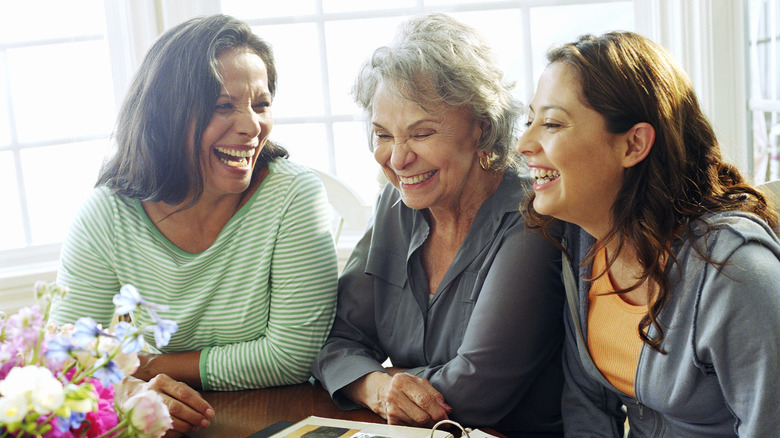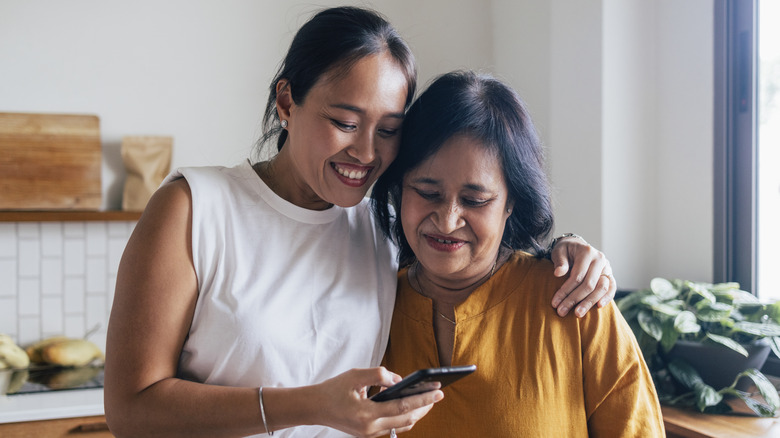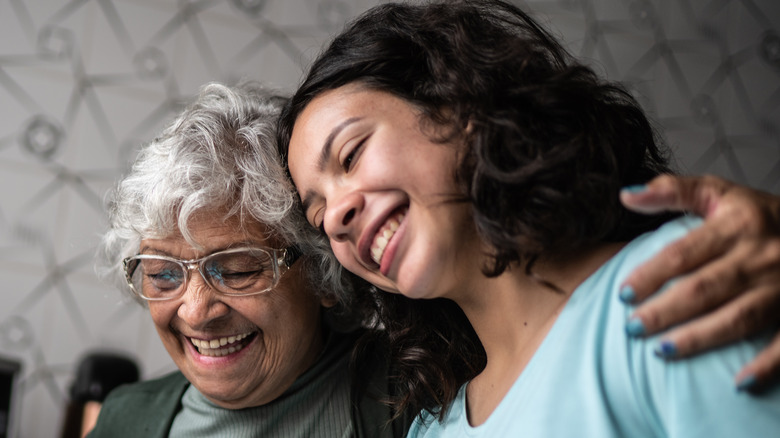Age Gap Friendships Are The Gift That Keeps On Giving — Here's Why
If you don't have a friend who's 15 years older than you (or 15 years younger, depending on your age), then get out there and get one. Seriously. If your immediate inclination is that you might not have much in common, you're not totally wrong — that's one of the joys of age-gap friendships. You're both bringing something to the relationship that, perhaps, neither one of you had before.
Not only are these relationships wonderful for everyone involved, but according to a 2019 AARP survey, 37% of adults have intergenerational friendships, meaning an age gap of 15 years or more, and 45% of those friendships have lasted 10 years or longer. Research has also found that these types of friendships create greater empathy for our fellow humans and help to diminish the outdated thinking that people only have so much to give up until a certain age.
"When you have real friends, your burdens are lighter, and your joy is amplified. Having women who love and accept you as you are and simply want you to get what you want in life is incredibly empowering," psychotherapist Terri Cole told Today. "The age really doesn't matter when you're really making a soul connection. Sharing and making heart connections at any age releases dopamine and makes us feel good." As older generations confront aging with confidence and younger generations are taking the reins and steering our society, these friendships are making people realize that age really is just a number.
You get to see life through a different lens
Whether you're the 25-year-old or the 40-year-old in the friendship, you both get insight that you may not have encountered otherwise. Someone who's 40 is a young Gen-Xer/older Millennial, so they recall things like the late '80s, the time before the Internet and cell phones, and a moment in history when Jared Leto was colloquially known as Jordan Catalano. On the other hand, someone who's 25, as a Gen-Zer, can pretty much explain to the 40-year-old exactly what's going on with their generation in regards to terminology, music, and their need to dress the way the 40-year-olds did in high school. Of course, it goes deeper than that — although Jordan Catalano is always a great topic.
"Friendships that span different stages of life can carry a special depth to them that friendships among peers cannot," clinical psychologist Dr. Andrea Bonior told HuffPo. "Different generations bring different experiences and attitudes to the table, and they can open us up to new horizons and viewpoints on everything from technology and politics to hobbies and cultural trends."
Intergenerational friendships, depending on how big the span, can also have a mentor-type feel to them but in a more casual way than, say, a college professor or something similar. Whereas if the older friend has a child their younger friend's age, they can get feedback on why their child does what they do. It's a meeting of not just generations, but a meeting of the minds that complement each other in an interesting and thoughtful way.
You won't compare lives
If there's anything social media has done, it's created a culture in which people compare their lives to others — and not in a healthy way. All you have to do is look at the list of the people who have died in their attempts to take selfies for Instagram to know that comparison culture isn't just extremely harmful, but toxic too. But when two friends are at different places in their lives, there's no comparison to be had. Instead, you have camaraderie, mutual respect, and a pure friendship made up of authentic people who aren't trying to one-up or impress the other.
"We know that everyone's lives are different, but we remember this more easily with a friend who is in a different life stage," friendship expert and author of "The Business of Friendship," Shasta Nelson told Good Housekeeping. "That openness can lead to less comparing, less judgment, less competition."
Although comparison isn't a sign you might be a bad friend, per se, in the culture in which we live it can be oppressive. Loving and supporting your friends, and watching them flourish into all the things they aspire to be is a healthier way to have a friendship. When there's an age gap between friends, that becomes more of your focus, as opposed to who's where in their career and life, and who still has further to go.
You'll bring out things in each other that sometimes your peers can't
Even though you might be the same age as someone, it doesn't mean that you're at the same point in your life. If you're someone who's not interested in kids or marriage, it can be hard to navigate a friendship with peers who are, especially once they all start running off to the chapel. But someone older, who has all that behind them, might be at the exact same stage as you, meaning they have time to travel, explore, and enjoy the things that your married and parent friends have put on hold for the moment. Having a younger friend can also revitalize someone who may have forgotten how much fun life can be, just as having an older friend can offer wisdom, life experience, and guidance in a way that's like that of an older sister or brother — but without the sibling rivalry or family drama.
Although age gaps are apparent when we're young, as we get older it's easy to lose track of who is what age and that's a good thing. The year someone was born shouldn't affect whether or not they can be friends — that's just ridiculous. If we allow age to be a factor, for anything really, then we're missing out on a bunch of opportunities to know and love a lot of cool people.



